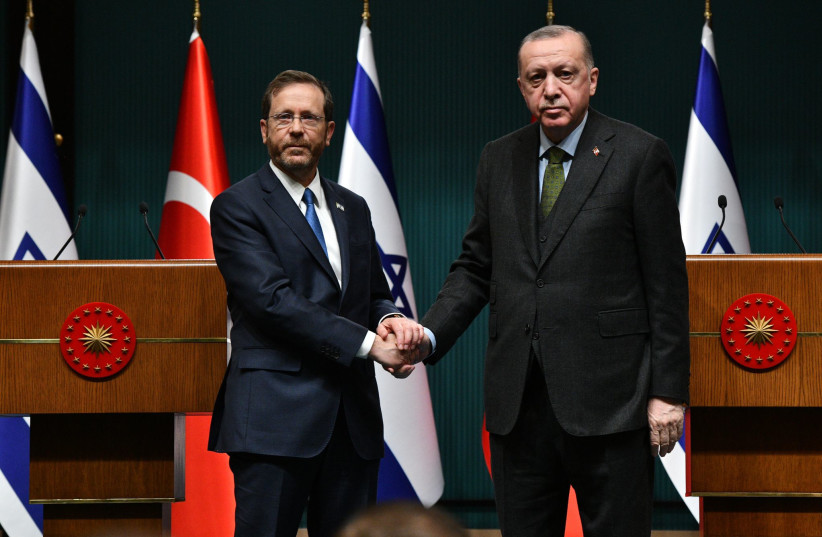The Palestinian Authority does not believe that President Isaac Herzog’s visit to Turkey will affect its strong relations with Ankara, a Palestinian official said on Thursday.
The PA has refrained from publicly commenting on the rapprochement between Israel and Turkey, while Hamas, Palestinian Islamic Jihad (PIJ) and other groups condemned Herzog’s visit.
“We don’t expect Turkey to change its longstanding policies of supporting the Palestinians,” the official told The Jerusalem Post. “We have strong relations with Turkey in several fields, including economic and security issues. Turkey is unlikely to change its stance toward the Palestinians and the Palestinian issue as a result of the visit of the Israeli president.”
Unlike Hamas and PIJ, the PA leadership has stopped attacking Arab countries for hosting Israeli leaders. The decision is seen in the context of the PA’s desire to avoid causing further damage to its relations with these countries, especially the Gulf states.
The PA had strongly denounced the normalization agreements between Israel and the United Arab Emirates and Bahrain, a move that drew sharp condemnations from many Arabs in the Gulf.

Scenes of Palestinians burning flags and photos of the leaders of the two Gulf states triggered widespread anger and accusations that the Palestinians are being ungrateful to those Arabs who helped them over the past few decades.
Relations between the PA and Turkey have significantly improved in recent years, especially in light of Turkish President Recep Tayyip Erdogan’s fiery rhetoric against Israel.
Additionally, Turkey has increased its “charitable” activities in east Jerusalem and al-Aqsa Mosque compound (Temple Mount), much to the satisfaction of the PA.
“Jerusalem is ours, Jerusalem is from us,” Erdogan declared in a speech to Turkish lawmakers in 2020. “In this city that we had to leave in tears during the First World War, it is still possible to come across traces of the Ottoman resistance.”
For the PA, the existence of some kind of Turkish influence in Jerusalem is a way of foiling Israel’s alleged scheme to “Judaize” the city.
But another official in Ramallah expressed concern that the Palestinians could pay a “political price” as a result of the Israel-Turkey rapprochement.
“Our fear is that Turkey would from now on endorse a different approach toward the Israeli-Palestinian conflict,” he said. “They are likely to tone down their rhetoric against Israel.”
While the PA has been silent about the rapprochement, other Palestinian groups have come out against Herzog’s visit to Turkey.
The first to comment was Hamas, which has several senior officials and activists in Turkey. However, Hamas was careful not to directly attack Turkey or Erdogan.
“Hamas followed with great concern the visits of officials and leaders of the Zionist entity to a number of Arab and Islamic countries,” read a statement issued by Hamas. “Hamas expresses regret over these visits to our brothers in Arab and Islamic countries, and calls for not giving the Zionist entity an opportunity to penetrate the region and tamper with the interests of its people.”
The toned-down statement reflects Hamas’s fear that the Turkish authorities might crack down on the group’s members or expel them from Turkey.
PIJ and the Popular Front for the Liberation of Palestine (PFLP), however, took a harsher stance towards Turkey.
PIJ condemned the visit of Herzog, and accused Ankara of being “biased in favor of the occupation” and “betraying Jerusalem and Palestine.” The group said it “highly appreciates the strong positions of the Turkish Muslim people who rejected the visit.”
In a separate statement, the PFLP accused Erdogan of misleading and deceiving the Arabs. The group said that it “has never been deceived by the truth of the Turkish official policy.”
It accused Turkey – a member of NATO – of being in collusion with Israel and the enemies of the Arabs and supporting terrorist groups in Iraq and Syria.
The PFLP called on the Turkish “national and progressive forces to confront the regime’s policy of normalization and expanding its relations with the [Israeli] entity because it will only be at the expense of the Arabs and their interests, and at the expense of the Palestinian people and their national rights.”
